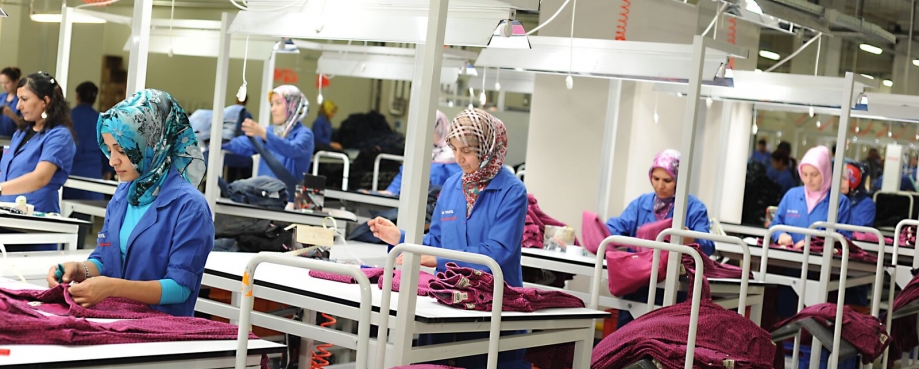
ETI’s Martin Buttle reports on our annual meeting on Turkey’s garment and footwear sector and the challenges Turkey’s industry and workers face.
Here’s what ETI believes.
Local coalitions – platforms of interested parties – are a key mechanism in finding solutions to local problems.
Turkey’s footwear and garment sector is a case in point.
As we have pointed out previously, Turkey is a fast fashion hub where its ability to produce fashion quickly is part of its USP.
Yet this can result in cutting corners. Particularly, as over the last six years, Turkey has had to absorb three million Syrian refugees.
Many are working in the footwear and garment sector and are hugely vulnerable to exploitation.
That needs to be acknowledged.
But we also must acknowledge what is being done to safeguard workers – both Syrian and Turkish – as was discussed at our Turkey platform 2018 annual meeting.
Strengthening the garment sector
ETI facilitates an apparel and textiles platform in Turkey which aims to strengthen the garment sector’s ability to implement the UN’s General Principles on Business and Human Rights.
Since its inauguration in 2016, it now reaches 30 brands and retailers, employer associations, trade unions and civil society as well as thousands of factories. Its steering group includes important industry voices including ITKIB, TTSIS and TGSD and it has wide-ranging industry and governmental support.
As part of the platform’s operating principles, it meets every year to assess progress and plan for the future.
This year’s meeting in Istanbul attracted delegates from business (local and international) trade unions and civil society as well as government representatives.
They heard that three working groups have been established made up of ETI member brands, employers’ associations, trade unions and NGOs.
Those groups raise business and human rights awareness, promote workplace social dialogue, and address the root causes of any human rights issues.
Over the last year (in addition to progress which has been reported in earlier blogs and on our programme webpages) we have seen:
- Workshops organised for supplier factories (in collaboration with the IMPR/UNHCR) on the needs of Syrian refugees, what constitutes illegal work and obtaining legal work permits.
- The production of a guide to buying responsibly, preparatory research for a planned study on purchasing practices and activities coordinated with ACT (Action, Collaboration, Transformation) around paying living wages.
- Training on workplace social dialogue delivered to supplier factories nominated by ETI member brands, and worker representative systems introduced.
Many steps forward
It is obvious that Turkey is already many steps forward from where it was a year ago.
The government, for example, has introduced a temporary protection regime for Syrian refugees.
It is driving forward work permit legislation and is building the capacity of institutions, businesses and of Syrian workers themselves to work legally in Turkey.
The ETI facilitated Platform has recognised that any initiative towards Syrian workers should take into account the situation of Turkish workers as well as the specifics of the Turkish labour market and it is addressing key issues that rightly sit with businesses themselves to take forward.
But I would be remiss if I didn’t concede that challenges remain and all stakeholders, including ETI, must continue to cooperate.
As discussed at the meeting, these challenges include collaborating around issues such as audits (they’re essential but there is huge debate about their true worth and whether then can be streamlined), addressing structural problems within the industry itself (Turkey has 52,000 garment manufacturers with the vast majority employing less than 49 workers) and improving the ability and effectiveness of unions.
Very specifically, we know that transparency in the lower tiers of supply chains, particularly within subcontracting units, remains a challenge and one that must be addressed.
A detailed report on the day’s discussions is available and we’ll be taking forward several of the ideas raised.
Regional powerhouse
What’s clear is that Turkey is a regional powerhouse.
Its garment industry has the potential to become an architype for good practice – particularly around refugee working – providing gaps can be filled.
That’s why, over the next three years, our aim is to bring the industry together and bring more factories on board to address ingrained issues.
Importantly, we will build consensus on how to scale up efforts and support the growth of a high quality industry that meets international expectations around business and human rights.
If companies or organisations would like to join the Turkey Platform email martin.buttle@eti.org.uk.
